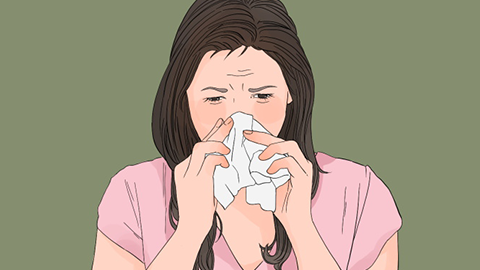What disease causes frequent nosebleeds?
Epistaxis may be caused by dry air, nasal mucosa damage, allergic rhinitis, sinusitis, thrombocytopenic purpura, and other factors. If symptoms persist or worsen, timely medical attention is recommended. Detailed explanations are as follows:

1. Dry air: When the environmental air is excessively dry, the nasal mucosa loses moisture more quickly, becoming dry and fragile, thus prone to rupture and bleeding. A humidifier can be used indoors to regulate humidity, and normal saline nasal drops can help maintain nasal moisture to prevent nosebleeds.
2. Nasal mucosal damage: Nose picking or external impact can easily cause nasal mucosal damage and bleeding. Minor bleeding can usually be controlled by applying pressure to the nostrils. Applying erythromycin eye ointment on the injured area may promote healing. If the bleeding is heavy, medical attention is required. Additionally, further nasal mucosal injury should be avoided.
3. Allergic rhinitis: After exposure to allergens, an allergic reaction occurs in the nasal mucosa, causing congestion, swelling, and frequent sneezing, which can easily rupture fragile capillaries and cause bleeding. Symptoms often include nasal itching, nasal congestion, and clear nasal discharge. Treatment may include budesonide nasal spray, loratadine syrup, and montelukast sodium chewable tablets as directed by a physician, along with avoiding allergens.
4. Sinusitis: When the nasal sinuses become inflamed, the mucosa remains congested and swollen. Inflammatory secretions can irritate and erode the mucosa, making it prone to bleeding. Symptoms often include thick nasal discharge, headache, and reduced sense of smell. Treatment options include amoxicillin capsules, eucalyptus oil and pinene capsule, and mometasone furoate nasal spray, which should be taken as per the prescribed course.
5. Thrombocytopenic purpura: Due to reduced platelet count or impaired function, coagulation function declines, making bleeding from the nasal mucosa and other sites more likely. Bleeding sites are numerous and difficult to control, and petechiae or ecchymoses may be visible on the skin. Treatment commonly includes prednisone tablets, aminopeptide tablets, and caffeic acid tablets. In severe cases, platelet transfusion may be required.
In daily life, frequent nose picking should be avoided, nasal moisture should be maintained, and nasal inflammation should be actively treated. If nosebleeds are frequent, heavy, or accompanied by other abnormal symptoms, prompt hospital visit for diagnosis and treatment is necessary.




